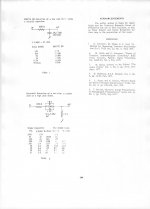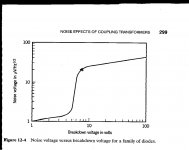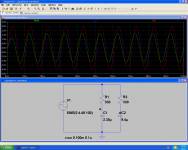Congratulations Elektroj, you have passed a primary listening test! Yes, normally, silver is BRIGHT sounding, electroplated silver over copper is at least as bright. We found decades ago, that silver has to be BROKEN IN for days and days with real signal across it, before it becomes comfortable to listen through.
With the CTC Blowtorch, we used the best pure silver wire we could find, found originally by BEAR, (of this website), then when it was on the spool, it was conditioned with real signal for at least 30 days, then after being cut and soldered in, another 30 days before we released the product to the customer. MY CTC Blowtorch is made this way, and it is wonderful sounding. More clear than copper, but not annoying either.
I did make VDH copper versions of the CTC Blowtorch. They sound OK, but softer from the get-go, and never as 'clear'. Good enough for most everybody.
With the CTC Blowtorch, we used the best pure silver wire we could find, found originally by BEAR, (of this website), then when it was on the spool, it was conditioned with real signal for at least 30 days, then after being cut and soldered in, another 30 days before we released the product to the customer. MY CTC Blowtorch is made this way, and it is wonderful sounding. More clear than copper, but not annoying either.
I did make VDH copper versions of the CTC Blowtorch. They sound OK, but softer from the get-go, and never as 'clear'. Good enough for most everybody.
general remark
Despite how rancorous this thread can be, I do applaud those bothering to attempt measurements, and those bothering to attempt to interpret them.
I'm also pleased about the endorsements of Python, which I have yet to adopt but sounds quite promising.
Brad
Despite how rancorous this thread can be, I do applaud those bothering to attempt measurements, and those bothering to attempt to interpret them.
I'm also pleased about the endorsements of Python, which I have yet to adopt but sounds quite promising.
Brad
Congratulations Elektroj, you have passed a primary listening test! Yes, normally, silver is BRIGHT sounding, electroplated silver over copper is at least as bright. We found decades ago, that silver has to be BROKEN IN for days and days with real signal across it, before it becomes comfortable to listen through.
With the CTC Blowtorch, we used the best pure silver wire we could find, found originally by BEAR, (of this website), then when it was on the spool, it was conditioned with real signal for at least 30 days, then after being cut and soldered in, another 30 days before we released the product to the customer. MY CTC Blowtorch is made this way, and it is wonderful sounding. More clear than copper, but not annoying either.
I did make VDH copper versions of the CTC Blowtorch. They sound OK, but softer from the get-go, and never as 'clear'. Good enough for most everybody.
It's just downright depressing to see suff like this written by adult human beings. It's as if "high end audio" is nothing but a religion started by L. Ron Hubbard.
se
Last edited:
Zeners are quite noisy at 6.2 volts, and the reason for a buried zener is for bette long term drift, 6.2 happens to be close to zero tempco, that is why the usual voltage for high stabiity is aound the 6.2 region.
You may be confusing the use of a 5.6V zener and a forward-biased small-signal diode, the prototypical 6.2V reference combination with compensated tempco, with the single zener ~zero tempco, which occurs more in the vicinity of 5V (I found a 1N5231B usually close to 4.78V, although this entailed an uncomfortably low Iz sometimes).
Although the buried zener is cited for good long-term stability, it is also mentioned as lower noise, for example:
LM199 | Shunt Voltage Reference | Voltage Reference | Description & parametrics
excerpt: "Further, a new [sic] subsurface zener structure gives low noise and excellent long-term stability compared to ordinary monolithic zeners".
As to zener noise vs. voltage, Motchenbacher and Connelly advise the use of zeners in the "true zener" (internal field emission) voltage range, e.g. not in the higher voltages that depend on avalanching. See their example:
Attachments
The big snag is that the distortion difference between serial and parallel caps (with the same net capacitance or, equivalently, adjusted frequency) is much smaller than the difference between NuF and 4NuF at the same frequency. If you are testing something you have to make sure you are testing what you want to test, not something different.Esperado said:In this simple circumstance, the question could be (for me) "What is the best solution to minimize distortion, using a given value of final capacitance between 3 set-ups: 2 caps in Serial, 2 caps in parallel or only one." It seems to me it make sens.
Plain copper wire gradually sounds duller as the years go by, although if you live near the sea your friends may be green with envy at the quality of your interconnects. Those who prefer a softer sound should try aluminium. Mercury sounds almost liquid! And of course, we all know what mud sounds like.john curl said:Yes, normally, silver is BRIGHT sounding, electroplated silver over copper is at least as bright.
Let's not sink into noise by omitting basics. LTSpice works OK and gives same results as MicroCap. The problem is not in LTSpice.
Third time: In LTspice V(a,b) specifies the voltage between points a and b, no?
What then specifies the voltage V(2,2)?
Jan
The big snag is that the distortion difference between serial and parallel caps (with the same net capacitance or, equivalently, adjusted frequency) is much smaller than the difference between NuF and 4NuF at the same frequency. If you are testing something you have to make sure you are testing what you want to test, not something different.
Check this post, please. Yes, only 2NuF vs. 1NuF.
http://www.diyaudio.com/forums/loun...ch-preamplifier-part-ii-6684.html#post4312816
> It's as if "high end audio" is nothing but a religion started by L. Ron Hubbard.
You should get John Travolta to endorse your cables.
Sorry, no "religion" behind my cables.
se
Third time: In LTspice V(a,b) specifies the voltage between points a and b, no?
What then specifies the voltage V(2,2)?
Jan
Hi Jan,
Yes, V(a,b) = V(a) - V(b)
V(a,a) or V(b,b) makes straight line, zero.
Attachments
YESThird time: In LTspice V(a,b) specifies the voltage between points a and b, no?
There is no such thing: there is V(n002,2) for example which means the voltage between net002 (attributed automatically by spice), and 2, a net I decided to re-label to use it as a test-point visible on the schematic.What then specifies the voltage V(2,2)?
Nitpicking is futile: everything has been made properly.
The interesting part is how to weight the costs of the different options, but I am not going to discuss it in this cesspit (some people seem to like it, but it isn't my case)
If you want a serious discussion on this very subject, it's here:
http://www.diyaudio.com/forums/parts/273799-non-linearity-polar-caps-arrangements.html
If you relish sniping, exchanges of insults or loony opinions, you can continue to debate here.... without me
Those people using silver wire are just so cheap, why don't they just go for the Gold! 
I can still remember this same argument and Scott disproving there can be a difference between copper and silver in the lengths of wire or interconnects that can possibly be used in an audio application. This thread has some real interesting things to learn and then we seem to go back into circles and add audiophile myth to the conversation.
PS. Yes I do own some silver wire and an exact matching pair of copper wire from Kimber, I surely can't hear any difference on the best speakers I have ever made. Sounds identical to me.
I can still remember this same argument and Scott disproving there can be a difference between copper and silver in the lengths of wire or interconnects that can possibly be used in an audio application. This thread has some real interesting things to learn and then we seem to go back into circles and add audiophile myth to the conversation.
PS. Yes I do own some silver wire and an exact matching pair of copper wire from Kimber, I surely can't hear any difference on the best speakers I have ever made. Sounds identical to me.
Plain copper wire gradually sounds duller as the years go by, although if you live near the sea your friends may be green with envy at the quality of your interconnects. Those who prefer a softer sound should try aluminium. Mercury sounds almost liquid! And of course, we all know what mud sounds like.
Verdigris - Wikipedia, the free encyclopedia
" It is usually a basic copper carbonate, but near the sea will be a basic copper chloride.[3] "
[3] Sharp, D. W. A: "Penguin Dictionary of Chemistry", page 419. Penguin Books, 1990 (2nd edition)
John, my experience with the 'sound of silver' goes back at least 25 years, it's just that I don't want to talk about it in the presence of conservative engineers and 'scope readers'. I don't know what's going on there, but, honestly, I don't care either. All I know is what parts/materials not to use and that's enough for me.Congratulations Elektroj, you have passed a primary listening test! Yes, normally, silver is BRIGHT sounding, electroplated silver over copper is at least as bright. We found decades ago, that silver has to be BROKEN IN for days and days with real signal across it, before it becomes comfortable to listen through.
If I had the extra pocket money, I'd try what you did with the spool and break-in process, but then I ought to be building/selling something in the Blowtorch range, which I won't, so, for me, the case is closed. I'm glad it worked for you.
Best,
Last edited:
When the best technical way to describe cables is the price tag, that really ought to tell us something.You are welcome Electroj, my first experience (I didn't like it) was back in 1978 when I bought a set of silver cables in Japan. Very expensive! $30 '-)
You are welcome Electroj, my first experience (I didn't like it) was back in 1978 when I bought a set of silver cables in Japan. Very expensive! $30 '-)
I might have received the same cables about then as a sample, and may still have them around somewhere.
Very heavy and inflexible, nearly too much for the plugs. I didn't like them either, and didn't use them.
- Status
- Not open for further replies.
- Home
- Member Areas
- The Lounge
- John Curl's Blowtorch preamplifier part II


